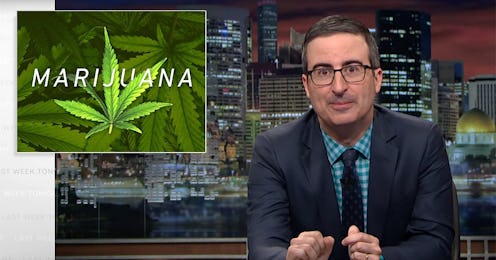
On Last Week Tonight on Sunday evening, John Oliver dedicated much of his show to advocating for the relaxing of strict federal marijuana laws. During this segment, Oliver briefly broke down the history of marijuana legislation in the U.S. during the Nixon administration, which proved both enlightening and disconcerting.
On his show, Oliver discussed the role of the Nixon administration in cracking down on marijuana's sale and use as well as lent insight into the supposedly surreptitious rationale behind the federal "war on drugs." During the Nixon administration, marijuana was classified as a Schedule One drug, which is the "highest" level of controlled substances and the only level of substances that cannot be prescribed by a doctor. Marijuana remains classified as Schedule One today, despite, according to advocates, much evidence demonstrating it does not merit this classification. In addition to imposing a strict classification for marijuana, the Nixon administration also created the federal Drug Enforcement Agency (DEA) as well as advocated for mandatory sentences for those convicted of drug offenses and encouraged no-knock warrants for drug raids.
While the restrictions imposed by the Nixon administration were jarring themselves, the alleged rationale behind the restrictions is even more disconcerting. According to Oliver, Nixon allegedly targeted marijuana in his war on drugs for racist and discriminatory reasons. Oliver played an audio clip of Nixon indicating that he believed that the majority of people advocating for marijuana legalization were Jewish, followed by the former president subsequently indicating that wanted to "hit the marijuana thing," implying that he wished to impose strong legal restrictions on it.
Other evidence also exists to bolster the notion that Nixon's administration allegedly sought to criminalize marijuana for discriminatory and political reasons. According to CNN, one of Nixon's former top advisors, John Ehrlichman, admitted that the war on drugs was used as a "political tool" against "antiwar liberals" and African Americans. CNN reported that Ehrlichman said the following about the issue in 22-year-old interview that was published for the first time in 2016 in Harper's Bazaar,
You understand what I'm saying? We knew we couldn't make it illegal to be either against the war or black, but by getting the public to associate the hippies with marijuana and blacks with heroin. And then criminalizing both heavily, we could disrupt those communities...We could arrest their leaders. raid their homes, break up their meetings, and vilify them night after night on the evening news. Did we know we were lying about the drugs? Of course we did.
According to CNN, Ehrlichman's comments constituted the first time the war on drugs had been overtly characterized as a political tactic designed to maintain and attract support for Nixon. This characterization stood in direct contrast to the way the Nixon's administration had portrayed the war on drugs at the time, saying instead that it constituted a proactive response to student drug use and was intended to protect society.
Overall, Oliver's segment on federal regulation of marijuana proved highly enlightening because it reminded audiences of the many detrimental implications of strict federal marijuana laws, as well as educated them about the allegedly unjust and discriminatory impetus behind the initial federal crackdown on marijuana and other controlled substances in the 1970s.
As America observes whether the Trump administration will continue the Obama administration's trajectory toward more relaxed marijuana laws or take the opposite approach and further entrench federal marijuana restrictions, it is important to be aware of the historical underpinnings of marijuana legislation and to carefully evaluate potential motives behind any decisions about the issue.